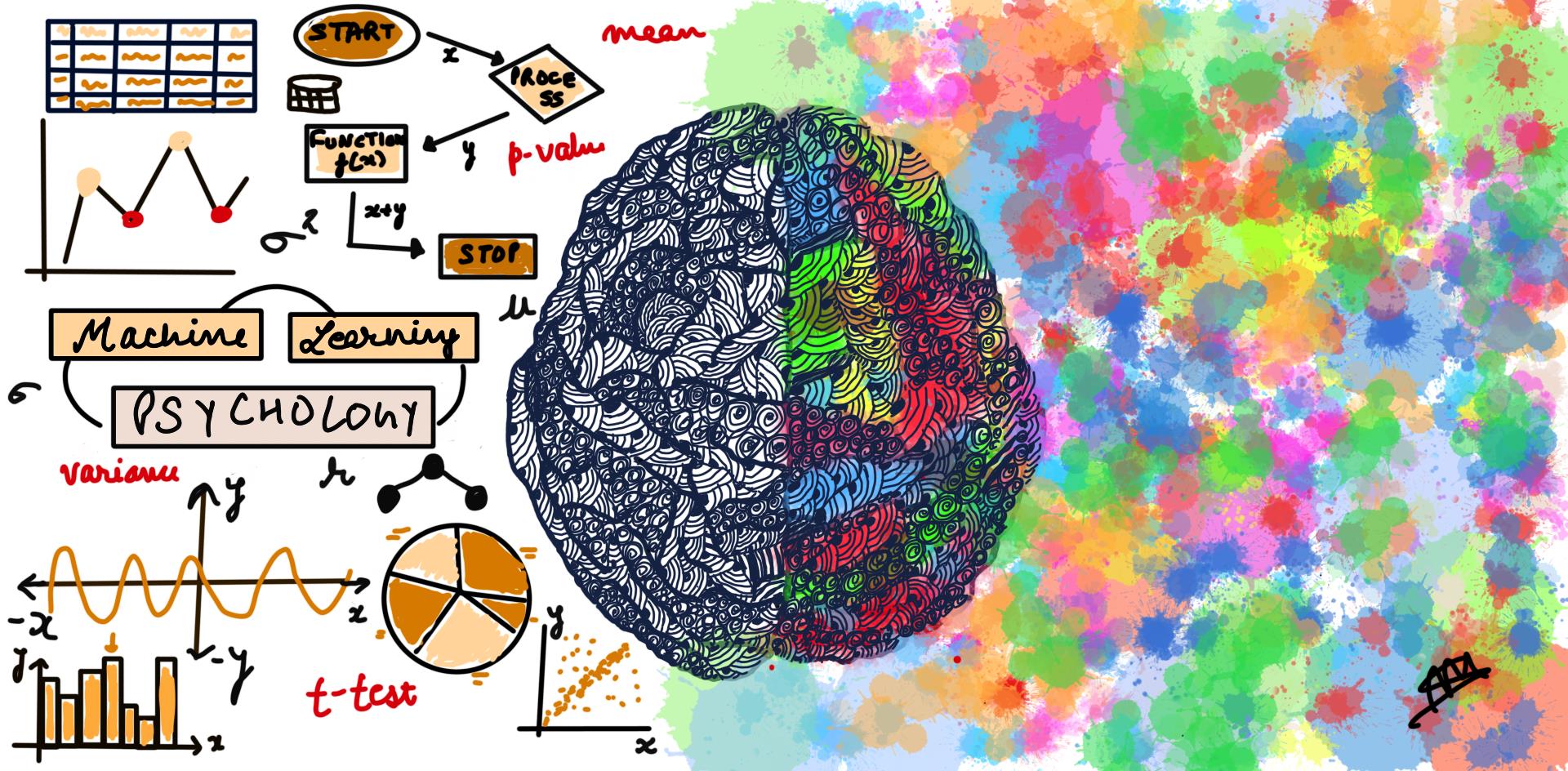Machine Learning
DEVELOPING PSYCHOLOGY OF COMPUTERS: WILL ARTIFICIAL INTELLIGENCE YIELD THE MACHINE ITS SIMULATED MIND?
Human mind and cognition: Psychology in Social Sciences is the study of the mind and behaviour of human beings. Its subject matter is how and why do humans behave the way they do or how do humans make sense of things in the world? Why do some actors be it individuals, groups, institutions or even nation-states; take decisions in a certain way? What is the judgmental and decision-making process that goes on in the backend? These are complex but critical questions that need to be understood. Thus, psychologists’ study perceptual processes, cognition, memory, linguistics, knowledge representation in the brain, consciousness, interpretation, judgments, decision making etc. They study the way information is processed in the brain. Psychology is divided into numerous specializations with cognitive psychology and cognitive science as emerging domains. One of the game-changing theories in psychology pertains to the Gestalt school of Psychology which postulates that the whole is bigger than the sum of its parts. In simple terms, it means that the image on the retina (sensory input) is not equal to the perceptual whole that is created in the mind. It can be less or more or even far more. The mind has the proclivity to fill gaps and create a meaning that is far more than sensory inputs. The number of stimuli gathered by senses and the way mind works are not linearly correlated. Also, each of the many billion humans on the planet have a distinct and special personality. Each human is different. While genetic codes do transfer through generations, yet no two human beings are identical. Further, human senses have limitations of what can be received by them. For example, human eyes and ears can receive inputs with respect to certain wavelengths and frequency only or they can discriminate between movement and stationery only if the objects are moving faster than particular frames per second. All these are anthropic limitations and we are designed that way. The observational selection effect is another aspect in meaning creation and knowledge reproduction. All these processes seamlessly operate in the human mind to yield meaning to external stimuli. Today’s neo-cortex is an evolutionary outcome of last 70,000 years .
Humanistic vs Mechanistic Mindsets: Analyzing these thoughts by their extrapolation in artificial intelligence and machine learning (AI & ML) environment; AI & ML engineers would need to understand how human brain works and more importantly how their mind functions. While computing power is growing exponentially; yet it is a very complex task to replicate human mind. We can say that each human is running a different algorithm which is a result of unlimited factors. Human’s behavior is guided by moods, feelings, emotions and personality traits. To incorporate all these into AI, it will take lot of imagination, innovation and very deep understanding. While it is true that many computers be at Alpha Zero or AlphaGo have displayed stupendous success by beating and outperforming the opponent, yet it does not establish that these can outperform these personalities in all other activities also.12 May 1997 was a landmark day when paradigm shift in artificial intelligence was formally captured after a very long AI winter. On this day IBM’s Deep Blue supercomputer defeated Kasparov . A lot has happened from days of DEEPBLUE of IBM to DEEPMIND of GOOGLE. While AI is progressing leaps and bounds as demonstrated by Boston’s ATLAS programme, but to take it to other extreme of argument that is we are actually already living in a simulation as given by Nick Bostrom , is something that this blog intends to opinionate on. This argument hypothesizes a very high possibility of we all living in a simulation already. AI evolution in its present form is based on specific applications. But to claim that eventually humans will be replaced from even decision-making processes may be a far-fetched thought as yet. While all facts were fiction before and facts eventually may also be proven falsified, as a budding data scientist, via this blog I only wish to highlight that there is a significant difference between humanistic thinking and cognition based on AI & ML.

Clash of logics: My next argument in this regard is based on the fact that humans and machines are logically different set ups. Humans work on abductive and inductive logics while computers can only work on deductive logics. Humans do not worry about structural validation or so-called syntactical validation, instead they focus on semantic validity. While this is a no go for machines. Is it therefore a clash of logics? Humans work on interpretative aspects gleaned from socio political and economic environment. But computers have no environment of this sort. While as per Aristotle, ‘Man is a social animal ’; but as per Thomas Hobbes, ‘People are inherently wicked and selfish ’. To incorporate these traits and create a social world for machines may be very complex and unfathomable task. Humans have relations, acquaintances, friends, enemies etc. Humans work on second level discourse albeit fallaciously yet machines function on formal logic or predicate logic . Thus, there is gap between human’s informal logic and machine’s first order logic. For machines to achieve all these aspects may be a science fiction as of now as depicted in Hollywood movie MATRIX.
Time speculation: All in all, what future holds for us as part of AI is still a distant scenario, but AI has a huge role in making human life better, happier and more fulfilling. AI can support humans but speculations that super computing power may lead to development of machines that may make humans as their slaves may be an imaginary scenario whose implementation is nay impossible as demonstrated by reasoning given in the body of this blog. A debate on self-driven cars is an example in this regard. In case of an accident who will be responsible, auto pilot, computer engineer who wrote the algorithm, mechanical engineer who manufacture the self-driven car or the factory owner or the car owner. Thus, artificial intelligence and artificial humans are a way apart. AI will be evolving rapidly but artificial mind will only be created after sometime. It has taken 70,000 years for present state of human mind to evolve, I think we will have to give reasonable time for AI systems to mature and work like humans. Speculations that these are likely to happen in next a few decades or by the turn of this century may need more consideration.
Computation vs Consciousness: A biological cell can fire at a speed in hertz, but an artificial neuron fires at GHz plus. Such is the disparity in computational power between humans and machines. Humans can never match the computational speeds and scales of computers. One understanding of consciousness is in terms of computation i.e., consciousness relates to several operations occurring in the human system at a given time. Psychologists define consciousness as a state of being aware of surroundings and inner self. Large number of stimuli hit human senses at a given time. But only selected a few are perceived while balance is rejected. Consciousness is best understood by its hindi translation which is ‘chetan’ or ‘chetna’. This word is a derivative of the Hindi word ‘chitt’ which means ‘mind’. So conscious is a person whose mind is operational. This is much more and far beyond the mere understanding of computation.
Conclusion: Artificial intelligence is revolutionizing the way humans’ function and human life operates. AI has tremendous benefits for mankind. However, naysayers and doomsday predictors have a perspective which would need to be not discounted. It is with those concerns accounted for that AI can truly serve the humanity and the life on mother earth. AI needs to be leveraged into all aspects of life so that human sufferings can be minimized and their quality of life, standard of living, happiness and overall, well-being may be enhance substantially.
References: Picture Credits: https://www.quantamagazine.org/brain-computer-interfaces-show-that-neural-networks-learn-by-recycling-20180327/
- Stephan. De Spiegeleire, , Matthijs Maas and Tim Sweijs, “Artificial Intelligence and the Future of Defense”, The Hague Centre for Strategic Studies, 2017. P. 20. Available at https://hcss.nl/sites/default/ files/files/reports/Artificial%20Intelligence%20and%20the%20Future%20of%20Defense.pdf. Accessed on 10 July 2020
- http://www.theguardian.com/technology/2017/dec/07/alphazero-google-deepmind-ai-beats-champion-program-teaching-itself-to-play-four-hours accessed on 26 January 2020.
- https://www.google.com/search?q=man+is+a+social+animal&sxsrf=AOaemvL29rwp5sQUpFUbqjGgAbXODMcHwA%3A1636300172810&source=hp&ei=jPWHYYOwL-vD5OUPpcmpQA&iflsig=ALs-wAMAAAAAYYgDnMluubY6tx7aFgBv6YSTQWVuJuDz&oq=man+is+a&gs_lcp=Cgdnd3Mtd2l6EAEYADIFCAAQgAQyBQgAEIAEMgUIABCABDIFCAAQgAQyBQgAEIAEMgUIABCABDIFCAAQgAQyBQgAEIAEMgUIABCABDIFCAAQgAQ6BwgjEOoCECc6BAgjECc6BQgAEJECOg4ILhCABBCxAxDHARDRAzoICAAQgAQQsQM6DgguEIAEELEDEMcBEKMCOgsIABCABBCxAxCDAToLCC4QgAQQsQMQgwE6CggAELEDEIMBEAo6BQguEIAEOggILhCABBCxAzoICAAQsQMQgwE6BwguEIAEEAo6CgguEIAEELEDEAo6CwguEIAEEMcBEK8BUP8JWNwWYOUuaAFwAHgAgAGzAYgBrwmSAQMwLjiYAQCgAQGwAQo&sclient=gws-wiz accessed on 07 November 2021
- Nick Bostrom, “Are We Living In A Simulation”, Philosophy Quarterly (2003) Vol. 53. No. 211, pp. 243-255. (First Version: 2001)
- https://www.google.com/search?q=man+is+a+selfish+by+nature&sxsrf=AOaemvKpwAiOmjiwmRenJ6Mtr3Heb3H0aQ%3A1636300475683&ei=u_aHYY-MKaWe4-EPpYOkmAw&oq=man+is+a+selfish+by+nature&gs_lcp=Cgdnd3Mtd2l6EAMyBggAEBYQHjoHCAAQRxCwAzoECCMQJzoFCAAQzQJKBAhBGABQ2SVYo0Ngp0toAnACeACAAdQBiAHLDJIBBTAuOS4xmAEAoAEByAEIwAEB&sclient=gws-wiz&ved=0ahUKEwjP1eSkzob0AhUlzzgGHaUBCcMQ4dUDCA4&uact=5. Accessed on 07 November 2021
- https://www.google.com/search?q=predicate+logic+meaning&sxsrf=AOaemvJNcpAnNlsQIBo8xWzKPyh9pEfskw%3A1636301545376&ei=6fqHYeaxFs7brQHfwaygAQ&oq=predicate+lo+meaning&gs_lcp=Cgdnd3Mtd2l6EAEYADIGCAAQBxAeMgYIABAHEB4yBggAEAcQHjIICAAQCBAHEB4yCAgAEAcQBRAeMggIABAHEAUQHjIICAAQBxAFEB46BwgAEEcQsAM6BwgAELADEEM6BwgAELEDEEM6CwgAEAcQHhBGEPkBOgoIABCABBBGEP8BOggIABCABBCxAzoFCAAQgARKBAhBGABQ6gZYvjpgxE9oAXACeACAAe8BiAHiDpIBBjAuMTEuMZgBAKABAcgBCsABAQ&sclient=gws-wiz. Accessed on 07 November 2021
